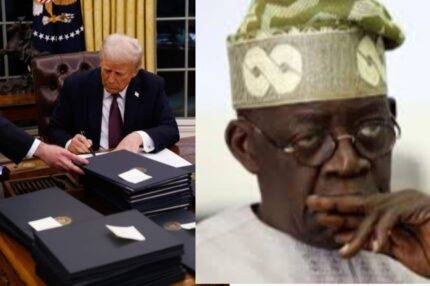Former U.S. President Donald Trump recently signed a series of controversial executive orders, sparking widespread debate over their potential impact on global geopolitics like Tinubu’s Economic Reforms. Among these decisions is a 90-day suspension of all U.S. foreign aid programs, pending a comprehensive review to align them with his administration’s objectives. This move has significant implications for recipient nations, including Nigeria, which heavily relies on U.S. aid to bolster its economy, healthcare, and security. Under Nigerian President Bola Ahmed Tinubu’s leadership, the country faces mounting challenges, particularly in controlling inflation and maintaining economic stability.
Impact on Tinubu’s Economic Reforms and Humanitarian Aid Programs
Nigeria has been a major beneficiary of U.S. foreign aid, receiving nearly $1.2 billion in assistance in 2022 alone. This funding supported various sectors, including economic development, education, and security initiatives. Among these, $355 million was allocated to humanitarian efforts to address critical issues such as food insecurity and the displacement crisis in the country’s northeast. With the 90-day pause on U.S. aid, many of these programs face uncertainty, potentially exacerbating already dire conditions for millions of Nigerians and negatively impacting Tinubu’s Economic Reforms.
President Tinubu’s administration, which has been grappling with soaring inflation rates, may find it increasingly difficult to maintain stability without U.S. financial backing. Inflation, driven by factors such as fuel subsidy removal and currency devaluation, has eroded purchasing power and increased the cost of living for Nigerians. The suspension of aid could limit the government’s ability to fund programs that cushion the economic blow on vulnerable populations, further straining the administration’s efforts to stabilize Tinubu’s Economic Reforms.
Trump’s Executive Orders Versus Tinubu’s Economic Reforms: Public Health Concerns
One of the most critical areas affected by the suspension is healthcare. The U.S. has been a pivotal partner in Nigeria’s health sector, providing funding for HIV/AIDS treatment, malaria prevention, and pandemic preparedness. In 2022, the Global Health Supply Chain – Procurement and Supply Management (GSHC-PSM) program allocated $69.75 million for HIV/AIDS initiatives, benefitting thousands of Nigerians. Additionally, the U.S. recently supplied 10,000 doses of the mpox vaccine in August 2024, a vital contribution in the fight against infectious diseases.
With U.S. health aid now on hold, Nigeria risks setbacks in combating major health crises. Programs that rely on U.S. funding to deliver antiretroviral treatments, vaccines, and essential medical supplies could face disruptions. This would not only undermine public health but could also strain Nigeria’s healthcare infrastructure, making it harder for President Tinubu to fulfill his administration’s goal of improving healthcare delivery across the nation.
Trump’s Executive Orders Versus Tinubu’s Economic Reforms: Military Cooperation at Risk
Nigeria’s security sector also stands to lose from Trump’s executive order. The U.S. has provided significant military assistance, including support through the Africa Military Education Program and the Trans-Sahara Counterterrorism Partnership. This collaboration has been instrumental in combating terrorism, particularly in Nigeria’s northeastern region, where Boko Haram and other extremist groups remain active.
In 2020, Nigeria purchased over $1.2 million in defense equipment from the U.S., and a U.S. Army Corps of Engineers member has been stationed at the Kainji Airbase to oversee critical projects. The suspension of aid could delay ongoing initiatives and weaken Nigeria’s capacity to address security threats. This, in turn, could have broader implications for regional stability in West Africa, where Nigeria plays a leading role in counterterrorism efforts.
A Call for Strategic Adjustments
Nigeria’s administration must act swiftly to mitigate the potential fallout from this suspension to avoid derailing Tinubu’s Economic Reforms. Diversifying Nigeria’s sources of international aid and strengthening partnerships with other nations and global organizations may be critical. Domestically, accelerating reforms to reduce dependence on foreign assistance, such as boosting local production and improving revenue generation, could help cushion the impact of reduced U.S. support.
For the U.S., this decision underscores the importance of balancing domestic priorities with global responsibilities. While Trump’s review aims to align foreign aid with U.S. objectives, it risks undermining critical international partnerships. For Nigeria, the pause on aid presents a moment of reckoning, highlighting the need for self-reliance and innovative governance in navigating economic and geopolitical challenges.
Table of Contents
Discover more from OGM News NG
Subscribe to get the latest posts sent to your email.














